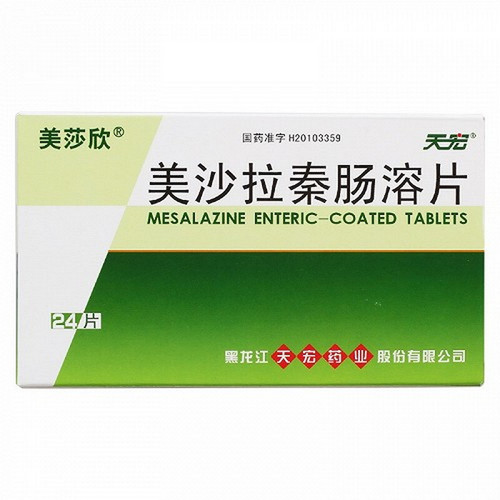Product Overview
[Drug Name]
Trade Name: Tianhong
English Name: Mesalazine Suppositories
Chinese Pinyin: Meishalaqin Shuan
[Ingredients]
The main ingredient of this product is mesalazine, whose chemical name is 5-amino-2-hydroxybenzoic acid.
[Properties]
This product is a white, irregular-shaped tablet with light brown spots.
[Indications]
This product is indicated for the treatment of acute attacks of ulcerative colitis.
[Dosage and Administration]
Adults: 1 tablet 1-2 times daily, or as directed by a physician. Children over 2 years old: Please follow a physician's instructions.
Instructions:
1. Have a bowel movement before using the suppository.
2. Use a latex fingertip to insert the suppository through the anus until it reaches a point where resistance is minimal.
3. To facilitate insertion, moisten the suppository with water or cream.
4. If the suppository flows within 10 minutes, insert another suppository.
5. Discard the latex fingertip after use.
[Adverse Reactions]
This drug is generally well-tolerated. 1-3% of patients experience diarrhea, nausea, abdominal discomfort, headache, vomiting, and rashes such as urticaria and eczema. Mild irritation, such as itching, rectal discomfort, and tenesmus, may occur after rectal administration. Hypersensitivity and drug-induced fever have been reported rarely. Rarely, muscle and joint pain, temporary hair loss, lupus-like reactions, shortness of breath, liver and kidney function impairment, myocardial and pancreatic inflammation, and changes in blood markers may occur. Some of these adverse reactions may also be related to the underlying medical condition. If other reactions occur, consult a physician promptly.
[Contraindications]
1. This drug is contraindicated in patients with allergies to mesalamine, salicylates, and excipients. 2. This drug is contraindicated in patients with severe hepatic or renal impairment. It is contraindicated in children under 32 years of age.
[Precautions]
1. Patients allergic to sulfasalazine may also be allergic to this drug; such patients may be at risk for allergic reactions to salicylates. 2. Use with caution in patients with hepatic or renal impairment. This drug is not recommended for patients with renal impairment. 3. Patients' renal function (such as serum creatinine) should be monitored regularly, especially during the initial stages of treatment. If patients develop renal dysfunction during treatment, mesalamine-induced nephrotoxicity should be suspected. These may include bleeding, bruising, sore throat and fever, myocarditis, and shortness of breath accompanied by fever and chest pain. If any of these adverse reactions occur, contact your doctor and discontinue treatment.
[Special Population Use]
Precautions for Children:
This medication is contraindicated in children under 2 years of age.
Precautions for Pregnancy and Lactation:
This medication should be used with caution in pregnant or breastfeeding patients and only when the prescribing physician determines that the benefits outweigh the risks. Mesalamine can cross the placenta, but data are limited to assess potential adverse reactions. Animal studies have not demonstrated teratogenic effects. Mesalamine is secreted in breast milk, but concentrations are much lower than those in maternal blood. The concentration of the metabolite, acetylmesalamine, in breast milk is similar to or slightly increased compared to maternal blood. There have been no reports of adverse reactions in breastfeeding infants following mesalamine use in breastfeeding women, but available data are limited.
Elderly Precautions:
Use the usual adult dose for elderly patients.
[Drug Interactions]
Unknown
[Pharmacological Action]
Mesalazine suppositories interact directly with inflamed intestinal tissue and do not exert their pharmacological effects through absorption. Inflammatory bowel disease (IBD) patients experience accelerated white blood cell migration, increased production of abnormal cytokines and arachidonic acid metabolites, particularly leukotriene B4, and increased free radical formation. Mesalazine inhibits leukocyte chemotaxis, reduces cytokine and leukotriene production, and scavenges free radicals. It is currently unclear which mechanism of action plays a primary role in clinical treatment.
[Storage]
Store in a dry place at 15-25°C.
[Specifications]
1g*7 tablets
[Packaging Size]
Box
[Expiration Period]
24 months
[Approval Number]
National Medicine Standard No. H20065650
[Manufacturer]
Company Name: Heilongjiang Tianhong Pharmaceutical Co., Ltd.







